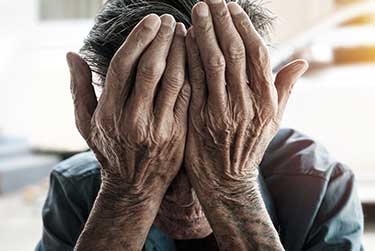 The fact that approximately 10 percent of elderly persons (defined as those who are 65 years of age or above) are victims of abuse, according to data presented by the National Center on Elder Abuse (NCEA), may seem shocking and unbelievable – who would intentionally cause harm to an elderly person who requires care from another?
The fact that approximately 10 percent of elderly persons (defined as those who are 65 years of age or above) are victims of abuse, according to data presented by the National Center on Elder Abuse (NCEA), may seem shocking and unbelievable – who would intentionally cause harm to an elderly person who requires care from another?
Unfortunately, elder abuse takes place at an alarming rate in Georgia and throughout the country, with both at-home caregivers and nursing home professionals being guilty of abuse and neglect.
If you suspect elder abuse, it is critical that you report it immediately; failure to do so could have a negative effect on the affected elderly person.
At the Blasingame, Burch, Garrard & Ashley, P.C., our experienced elder and nursing home abuse lawyers can help you to recognize the signs of elder abuse, report elder abuse to Adult Protective Services, and pursue damages for harm.
Call us today to learn how we can help.
Types of Elder Abuse
The NCEA recognizes the following types of elder abuse:
- Physical abuse, which includes hitting, biting, kicking, improperly restraining, over- or under-medicating, or otherwise using physical force in an inappropriate way against an elderly person.
- Psychological or verbal abuse, which involves tormenting, teasing, humiliating, threatening, or harassing an elderly person, as well as preventing the elderly person from engaging in social activities or intentionally ignoring the elderly person.
- Sexual abuse, which includes any and all unwanted sexual activities between a caregiver and an elderly person, including inappropriate and unwanted touching, sexual assault or rape, and showing or taking naked pictures without consent.
- Financial exploitation, which refers to taking advantage of an elderly person financially via manipulation, deceit, or threat. For example, a caregiver may convince an elderly person to amend their will to include the caregiver or may steal cash or credit cards from the caregiver.
- Neglect, which refers to the failure to provide the elderly person with the level of care they need and are entitled to, even if this is not intentional. For example, if a nursing home is understaffed, an elderly person may not receive proper health care, nutrition or hydration, bathing and grooming services, social interaction, and other critical facets of care and wellbeing.
Signs and Symptoms of Elder Abuse
As a loved one of an elderly person, it is important to know the warning signs of elder abuse and to continually talk to your loved one about how they are faring.
Some of the signs and symptoms of elder abuse include:
- Physical signs of abuse, such as bite marks, slap marks, bruises, lacerations, unexplained injuries (like a bone fracture), and abrasions;
- Signs of sexual abuse, such as torn or bloodied undergarments or clothing, genital infections, and signs of physical abuse, such as bruises;
- Signs of neglect, such as poor hygiene, weight loss, deterioration in condition, lack of basic medical aids (like glasses);
- Signs of emotional and psychological abuse, including withdrawal from friends, family, or social activities, depression, anxiety, anger or/and angry outbursts, deterioration in physical condition, and fear about being in a nursing home or left alone with a particular caregiver; and
- Signs of financial exploitation, which might include changes to an elderly person’s finances, such as the opening of a new credit card or bank account, and missing cash or valuable items.
What to Do if You Suspect Abuse Is Occurring
If you suspect that abuse is occurring, it is important that you act quickly, and our lawyers can help. Steps to take if you suspect abuse include:
- Call 911: If you believe that abuse is occurring and you believe that your loved one is at imminent risk of injury or death, do not hesitate to report the matter to the police immediately.
- Document abuse. One thing that can help Adult Protective Services, and assist in your claim for damages, is documenting abuse early on. Write down everything you see and any potential abuse-related incidents (such as a slip and fall or unexplained injury).
- Talk to the nursing home manager. We recommend bringing your concerns to a nursing home manager or supervisor and seeing what remedies are offered. If nothing changes and your worries about abuse are not alleviated, take further action.
- Report the abuse to Adult Protective Services (APS). APS is responsible for investigating all alleged cases of abuse against adult persons. You can report the abuse online or by phone.
- Call our law firm. When you call an experienced Georgia nursing home abuse lawyer, our lawyers can guide you through your rights and the rights of your elderly loved one, assist you in reporting abuse to APS, and represent you in building a claim against the nursing home to recoup damages for harm suffered.
Get Your Free Consultation Today
Our Georgia nursing home abuse lawyers are passionate about protecting elderly persons throughout our state. If you notice any of the warning signs of abuse, do not hesitate to call our law firm directly for your free consultation.
We will aggressively advocate for you and your loved one.

